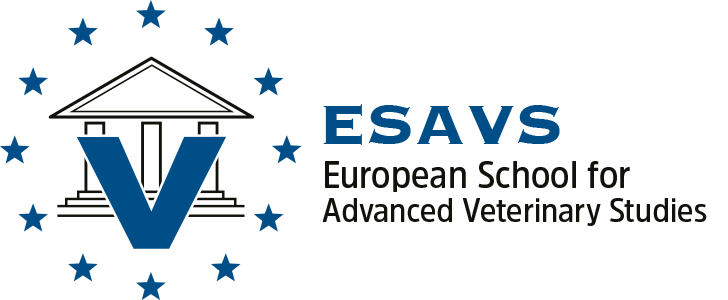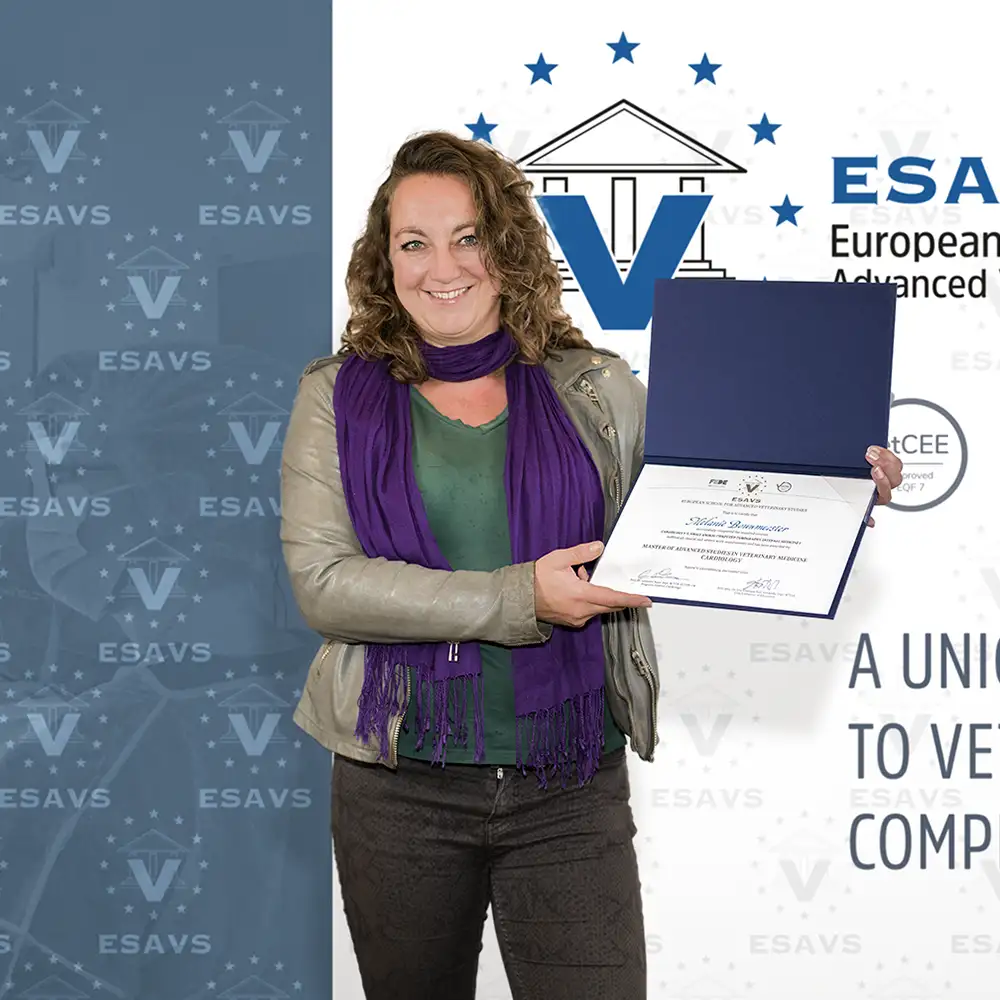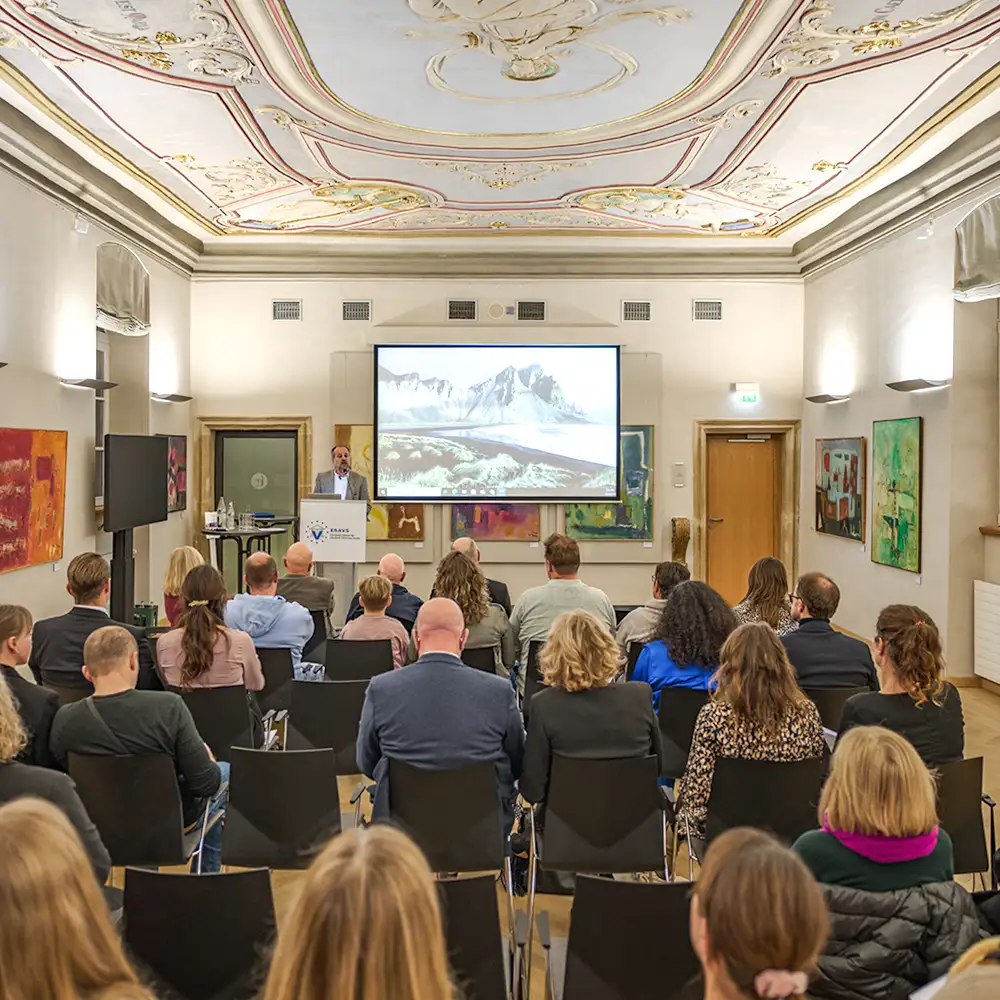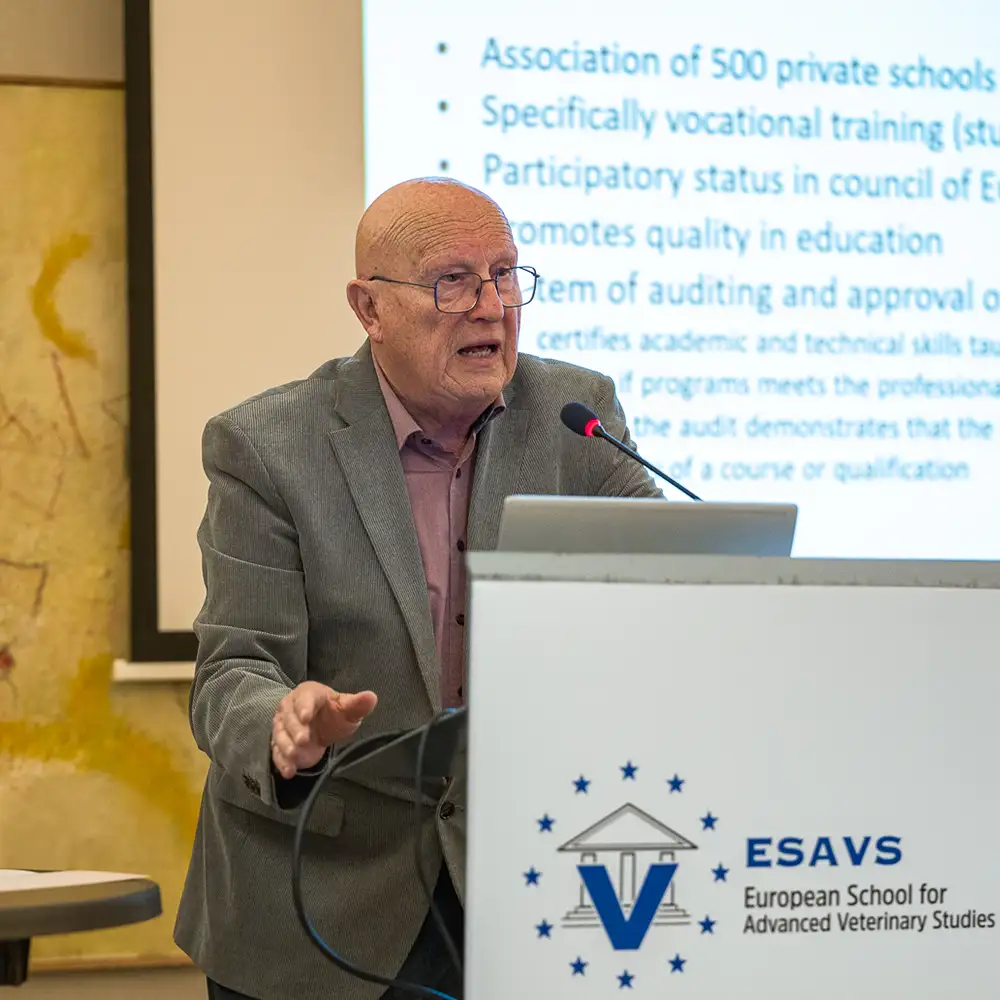European School for Advanced Veterinary Studies
Introduction
The Master of Advanced Studies in Veterinary Medicine (MASVM) is based on the well-known ESAVS residential courses in the discipline of your choice and beyond, examinations of these courses and, keeping a case log and completing a thesis consisting of 10 case reports and an oral examination. This program promotes application of newly learned methods and skills in daily practice at home and throughout the entire study period. The minimum duration of the program is three years and can be extended up to five years.
Any veterinarian can enter the program immediately after graduating from veterinary school, but the MASVM can only be obtained when the applicant has been practicing within the chosen discipline for at least four years since obtaining her/his veterinary degree.
A completed MASVM program testifies that you have obtained an intermediate level of comprehensive theoretical and clinical competence, as defined by the leading European veterinary organizations in a chosen discipline. A range of study programs are offered consisting of a series of consecutive courses covering all important aspects of the discipline and beyond. Based on such comprehensive programs ESAVS offers the opportunity to obtain the MASVM in a specific discipline.

Discipline Specific Requirements
While the requirements are generally the same for all disciplines, there are some discipline specific aspects relating to the coursework as well as the case log. Therefore, specific program descriptions for each discipline are available by clicking on the respective discipline.
Obtain the Master of Advanced Studies in Veterinary Medicine by Studying While Working
The MASVM program allows you to study while practicing small animal veterinary medicine. This means that the formal instruction is part-time in the form of courses taken at intervals during the program. It is expected that students gradually apply the skills they acquire in the formal part of their education to their daily work in practice. Therefore, in addition to the coursework, students are required to compile a case log and complete a thesis consisting of case reports and an oral examination.
This type of diploma or degree testifies that its holder has achieved competences and skills which have been evaluated and examined by a board of experts. It is now internationally accepted that extra-occupational studies leading to a Master’s degree should be based on specifically designed continuing education programs called Master of Advanced Studies (MAS), also known as “professional” or “executive” Master. An MAS focuses on practical experience and skills rather than on scientific and research experience of the traditional Master of Science (MSc).
Objectives
- Acquire competence in the promotion of health as well as in the diagnosis, prevention, and treatment of diseases of small animals at a level which serves the needs of the consumer of modern high quality veterinary care
- Become well versed in a selected discipline of small animal veterinary medicine and interact optimally with EBVS diplomates
- Acquire clinical problem-solving skills, rather than skills in accumulating knowledge. Therefore, the teaching is problem-based using state-of-the-art didactic techniques offered by our experienced ESAVS faculty, who are recruited from among the recognized specialists in Europe and beyond
- Be capable of critical information retrieval and literature search as well as scientific writing
- Lay a foundation for continuous life-long professional development in the chosen discipline
ECTS credits obtained in the CASVM program
ECTS credits collected in coursework and the case log during a CASVM program in the same discipline as the MASVM will be fully validated to meet the MASVM requirements in the said discipline.
ECTS credits collected during a CASVM program in a different discipline as the MASVM can in part be validated pending evaluation and approval of the Post Graduate Educational Committee.
Quality Assurance

The MASVM programs are approved by the Federation for Education in Europe (FEDE), an international association of about 500 private schools of higher education and which holds participatory status in the council of the European Union.
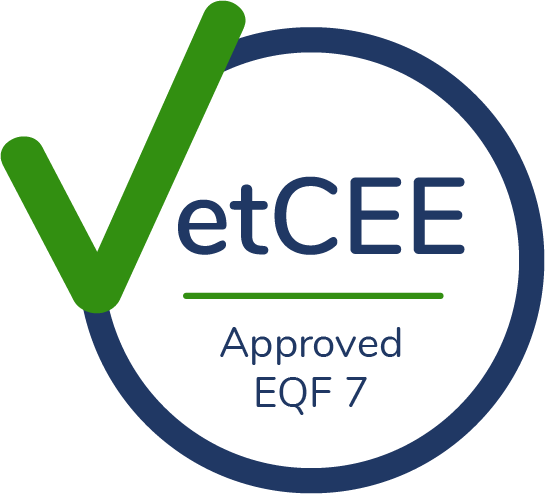
They are also accredited by VetCEE, an independent non-profit association which provides quality assurance and accreditation of national and international programs for Continuing Veterinary Education (CVE) in Europe and facilitates the recognition of Continuing Professional Development (CPD) between the various countries in Europe and beyond.
The program is supervised by the Post Graduate Education Committee (PGEC) which consists of the ESAVS Director of Education and five professors of veterinary medicine or associated disciplines from various European universities. At the end of each semester the PGEC functions as a Jury and validates all grades achieved by participants during the previous semester.
The PGEC is assisted by the Examination Board which consists of at least 10 specialists usually associated with ESAVS, representing various disciplines of small animal veterinary medicine.
Each discipline has a Program Director (PD) who defines and regularly updates the discipline’s program structure and specific requirements. The PD is also responsible for all program-related details.
The faculty of ESAVS (Principal Course Masters, Course Masters and Instructors) consists of internationally recognized veterinary specialists. The ESAVS faculty teaches in the courses and prepares the respective examinations.
All administration associated with the MASVM is handled by the Certificate/Master programs department at the ESAVS office.
Important Dates
for Master and Certificate Students
The MASVM program is offered in the following disciplines:
CARDIOLOGY
Master of Advanced Studies in Veterinary Medicine (MASVM)
DENTISTRTY
Master of Advanced Studies in Veterinary Medicine (MASVM)
DERMATOLOGY
Master of Advanced Studies in Veterinary Medicine (MASVM)
DIAGNOSTIC IMAGING
Master of Advanced Studies in Veterinary Medicine (MASVM)
INTERNAL MEDICINE
Master of Advanced Studies in Veterinary Medicine (MASVM)
NEUROLOGY
Master of Advanced Studies in Veterinary Medicine (MASVM)
ONCOLOGY
Master of Advanced Studies in Veterinary Medicine (MASVM)
SURGERY
Master of Advanced Studies in Veterinary Medicine (MASVM)
General Overview
To obtain an ESAVS MASVM (in total 80 ECTS = European Credit Transfer System credits) in the discipline of your choice, you have to prepare for and attend ESAVS courses, which are offered in several European locations, participate in distance learnings, and pass the respective examinations (40 ECTS credits). You are also required to collect 200 well documented cases in the form of a case log (20 ECTS credits), and to complete a thesis consisting of 10 case reports (20 ECTS credits) as well as an oral examination which promotes the application of newly learned methods and skills in daily practice at home. Applicants who have already attended ESAVS courses in the past 5 years and who would like to enroll in the MASVM program can have their previous ECTS credits validated by the Examination Board, provided they pass the respective examinations.
The Certificate program (CASVM) and the Master program (MASVM) are the two continuing education options ESAVS provides. The CASVM is ideal for candidates who want to enhance their knowledge in a highly specialized field while avoiding the extra time required for the MASVM. Although the MASVM does require greater time commitment, it is perfect for those who desire a more comprehensive scope of knowledge and expertise within their chosen discipline. Before a participant enrolls in either program, they should consider which option is more suitable to their educational aspirations and time requirements.
It is possible to obtain the CASVM and the MASVM in the same discipline. This means once you have completed the CASVM program you may continue studying by enrolling in the MASVM program in the same discipline.
It is also possible, while being enrolled, to switch from the CASVM to the MASVM program (and vice versa), as long as you stay in the same discipline and switch no later than two years after the initial date of enrolment. All ECTS credits obtained will be transferred; the maximum study time still applies from the time of initial enrolment. It is only possible to switch programs once.
What are ECTS credits?
All work done by students is expressed in ECTS credits. 1 ECTS credit is equivalent to 25 hours of student work. In the ECTS it is generally accepted that each hour of formal coursework (lectures, practical work, tutorials etc.) generates an additional 2-3 hours of work for the student including preparation for lectures, practical work, tutorials etc., distance learning, additional reading, literature searches and preparation for and sitting the examination
Program Details
The MASVM program comprises four modules.
Module I and II:
40 days of coursework (in the form of major and minor courses including course preparation, distance learning, examination preparation and examinations)
Module III:
Clinical work and 200 well documented cases in the form of a case log
Module IV:
Thesis: 10 Case Reports and Oral Examination
Module I and II: Coursework (40 ECTS credits)
Participants are required to obtain a total of 40 ECTS credits in coursework. Coursework means active participation in classroom work, practical training, tutorials, and on-line assignments (distance learning), self-study and passing examinations. 5 days of coursework (about 40 hours) generate a total of 120-140 hours of students’ work. With one ECTS credit equaling 25 hours of students work, a 5-day course is assigned 5 ECTS credits, regardless of the subject since all courses are of the same standard. It is important to note that credits are only given for work which has been validated by a formal examination.
A minimum of 25 ECTS credits have to be obtained in the major subject, i.e. the chosen discipline, and any remaining ECTS credits have to be obtained in minor subjects which are discipline related. ESAVS classroom work and practical training typically consist of one to two weeks of residential training (40 and 80 hours of instruction, respectively). Specific information on the courses can be found on the ESAVS website.
Course Curriculum
Upon application, participants can compose their own curriculum within the limits set by the Program Director/s (PD) of the discipline (more information can be found in documents provided on the respective MASVM discipline page). The chosen course curriculum must be approved by the Post Graduate Educational Committee (PGEC) prior to successful enrolment to the program. Applicants are advised to plan the coursework well in advance.
Retrospective recognition of ESAVS courses: ESAVS courses taken within 5 years prior to enrolment in the MASVM program are usually recognized. Courses taken more than 5 years ago can be submitted but are subject to the approval of the PD. Proof of participation (certificate of attendance) must be submitted with the application and a passing grade for the respective examination must be obtained within the study period.
External coursework: Up to 5 ECTS credits of coursework (completed within 5 years prior to enrolment) may be obtained from courses or certifications outside of ESAVS. Such external courses must be of equivalent content, duration, and similar standards as well as examined by the external provider or alternatively passing an equivalent ESAVS exam. External courses with ECTS credits assigned must be approved by the PD prior to presenting it to the PGEC. It is recommended that applicants planning to include external coursework submit a detailed outline to ESAVS before the enrolment, as retrospective approval may not be given.
Examination: ECTS credits for coursework are awarded after passing the examination for each course. Examinations can be taken twice a year. All examinations are in the CASUS format, an online examination system. Results are graded on a 0-20 scale (<10=fail, 10-11.9=sufficient, 12-13.9=fair, 14-15.9=good, 16-17.9=very good, 18-20 excellent). The examination is passed when a grade of 10 or higher is obtained. In case of an insufficient grade (<10), the participant can retake the examination at the next examination date. A maximum of 4 attempts is allowed.
Module III: Clinical Work and Case Log (20 ECTS credits)
It is expected that participants will continuously and progressively apply the skills they have acquired in the MASVM program in their daily practice, supporting and reinforcing the learning process. The case log represents a condensed written account of this practical work.
Case Log
Participants are required to collect 200 well documented cases in the form of a case log. The case log is submitted preferably in two parts (two grades averaged). Based on the comments by the PD after submission of the first part, the second part can potentially be submitted including improvements. The cases are expected to mostly be collected in the second half of the program and reflect the chosen discipline. All data relevant to each case, including case identification, signalment and history, results of the examination and ancillary aids, laboratory findings, differential diagnosis, diagnosis, and prognosis, therapy, and outcome, must be filed in a digitalized format and must be accessible upon request. Please consult the respective case log instructions for each discipline for details. Cases can only be collected during the official enrolment period.
Examination: The participant is requested to submit their case log by uploading it onto the respective MASVM platform on eCampus. The case log is then reviewed by the respective PD (or an expert appointed by him/her) who is entitled to request all documentation on individual cases selected. The case log is graded on a 0-20 scale. The grading scale is <10=fail, 10-11.9=sufficient, 12-13.9=fair, 14-15.9=good, 16-17.9=very good, 18-20=excellent. The examination is passed when a grade of 10 or higher is obtained. In case of an insufficient grade (<10), the participant is notified about the shortcomings of the case log and requested to resubmit a revised version or submit additional cases within 6 months of notice.
Module IV: Thesis: 10 Case Reports and Oral Examination
The thesis consists of a series of 10 case reports covering a range of topics in the chosen discipline. Published case reports, (published during enrolment in the program) can also be submitted. One case out of the 10 case reports is randomly selected for the oral examination in an online format.
These case reports include a complete presentation of the case, illustrations where necessary, literature review including current publications on the subject with references and a discussion. The candidates must demonstrate a comprehensive understanding of the topic. Generally, a case report should contain 2000 words +/- 10%, excluding references and appendix. The combined case reports should not exceed a total of 20,000 words.
Participants are requested to submit their case reports by uploading them onto the respective MASVM platform on eCampus. Each case report is then reviewed by the respective PD (or an expert appointed by him/her) and graded on a 0-20 scale (<10=fail, 10-11.9=sufficient, 12-13.9=fair, 14-15.9=good, 16-17.9=very good, 18-20 excellent). The grades of the individual case reports are averaged to obtain one single grade. The average grade for the entire module must be 13 points or higher and none of the case reports must be graded below 10 points.
Published case reports, (published during enrolment in the program) can also be submitted. Published peer-reviewed case reports automatically receive at least a very good grade.
Duration of the Program
The minimum duration of the program is three years and can be extended up to five years. An additional year can be granted upon request and approval by the PGEC.
CASVM as Stepping Stone for the MASVM
Upon successful completion of the CASVM program it is possible to continue with the Master of Advanced Studies in Veterinary Medicine (MASVM) in the same discipline, if available. ECTS credits collected in the CASVM program are transferred to the MASVM program in the same discipline. Once, up to 5 ECTS credits obtained in a CASVM program in one discipline can be transferred to a CASVM or MASVM in another discipline pending evaluation and approval of the PD.
Certification
Following successful completion of coursework and case log, the Jury reviews all grades collected by the candidate and assigns a final overall grade on a scale 1-20. The maximum grade is 20 points. The grading scale is <10=fail, 10-11.9=sufficient, 12-13.9=fair, 14-15.9=good, 16-17.9=very good, 18-20 excellent. The MASVM program is successfully completed when an overall grade of 10 or higher is obtained. Upon passing, the participant is awarded the
Master of Advanced Studies in Veterinary Medicine (MASVM) / discipline.
The Master will be awarded at the graduation ceremony at the end of the year.
Responsible Institutions for the Master Program
The MASVM program is offered by ESAVS, an officially recognized school by the Federation for Education in Europe (FEDE), an international association of about 500 private schools of higher education. FEDE which holds participatory status in the council of the European Union has certified these programs. The teaching procedures have been audited and approved by a Swiss EduQua-accredited, supranational independent institution.
In addition, MASVM programs in all disciplines are accredited by VetCEE, an independent non-profit association. This accreditation agency for continuing veterinary education provides quality assurance and accreditation of national and international programs for Continuing Veterinary Education (CVE) in Europe and facilitates the recognition of Continuing Professional Development (CPD) between the various countries in Europe and beyond.
The program is supervised by the Post Graduate Education Committee (PGEC) which consists of the ESAVS Director of Education and five professors of veterinary medicine or associated disciplines from various European universities. The committee is assisted by a coordinator from ESAVS.
The duties of the PGEC include:
- Supervision of the quality of the program
- Regular review of the rules and requirements
- Collecting all examination grades and assignment of ECTS credits and a final global grade to each candidate following review of all data
- Management and interaction with the Program Directors
The PGEC is assisted by the Examination Board which consists of at least 10 specialists usually associated with ESAVS, representing various disciplines of small animal veterinary medicine. The committee is chaired by the Director of Education. The Examination Board is responsible for:
- Reviewing and grading the case logs and case reports
- Creation of course examinations
At the end of each semester the PGEC functions as a Jury and validates all grades achieved by participants during the previous semester.
Each discipline has a Program Director (PD).
- The PD is defining and regularly updating the discipline’s specific requirements and learning outcomes complying with the general rules and standards determined by the PGEC.
- The PD is defining, together with the other course master’s the major and the minor subjects of the discipline.
- The PD is responsible for overseeing the creation of CASUS-based examinations.
- The PD is appointing and inviting course masters in the responsible discipline to join the Examination Board.
- The PD is overseeing the evaluation/grading of all written work (case log, case reports) of the students enrolled in their discipline program. She/He can perform the evaluation her/himself or may also delegate the evaluation assignments to other members of the Examination Board.
- The PD defines discipline-specific guidelines for all written work: case logs, case-reports and master theses.
The faculty of ESAVS (Principal Course Masters, Course Masters and Instructors) consists of internationally recognized veterinary specialists from all over the world, most of which are university teachers. The ESAVS faculty teaches in the courses and prepares the respective examinations.
All administration associated with the CASVM is handled by the Certificate/Master programs department at the ESAVS office.
Admission & Fees
Who can register for the MASVM program?
What does the MASVM program cost?
How to apply?
Any veterinarian can enter the program immediately after graduating from veterinary school, but the MASVM can only be obtained when the applicant has been practicing within the chosen discipline for at least four years since obtaining her/his veterinary degree.
Candidates must hold a recognized veterinary degree from a University or equivalent institution of higher learning. Institutions that are listed in the “anabin” (Anerkennung und Bewertung ausländischer Bildungsnachweise) data base and received an H+ mark are accepted. Candidates holding a veterinary degree of an EAEVE/AVMA/AVBC accredited veterinary schools may enter the program immediately after graduation. Other candidates are required to have at least one year of professional experience in small animal veterinary medicine prior to entering the program.
The applicant must provide proof that for the whole duration of the program they are working full or part time (minimum 20 h/week) in a veterinary practice or clinic or discipline related facility with an appropriate case load and adequate facilities.
The fees comprise of a one-time application fee, a bi-annual registration fee, course tuition fees, examination fees and evaluation fee for the case log:
- Application fee: 60 EUR (to be paid upon sending your application documents – this fee is non-refundable, independent of whether you enrolled in the program or not)
- Semester fee: 290 EUR (covers the administrative costs and enrollment fees)
- Evaluation fee for written work per semester: 250 EUR (covers the evaluation of the case logs and case reports)
- Tuition fees: fees for the courses in the chosen discipline – please refer to the overview of the ESAVS Courses
- Course examination fees: 5-day course (5 ECTS credits) = 160 EUR / 10-day-course (10 ECTS credits) = 320 EUR
- Access to eLibrary is included in the semester enrolment fee for the duration of active enrolment.
PLEASE NOTE, THAT ALL OF THE FEES ARE SUBJECT TO CHANGE
Before you consider applying to an ESAVS MASVM program we encourage you to participate in one of the ESAVS courses in the discipline of your interest. This allows you to find out whether this discipline really interests you and whether the time commitment to complete an entire program is compatible with your daily work. ESAVS courses taken within 5 years prior to enrolment in a program are usually recognized.
Application Period for the Winter Semester (new students) – 1st – 31st May of the respective year
Application Period for the Summer Semester (new students) – 1st – 31st October of the preceding year
To apply for the MASVM program in the discipline of your interest, please take the following steps:
- Contact the ESAVS Office via Email (master-certificate@esavs.eu) expressing your interest in applying for the respective program/discipline.
- Make an online payment of the application fee (60 Euros). Click here to make your payment.
- After receipt of a confirmation of payment for the application fee, please submit the documents in the following list as an e-mail attachment in PDF format only.
Please make sure to send the files attached individually and named according to their content (NOT ALL IN ONE DOCUMENT!).
These documents will be forwarded to the Post Graduate Education Committee (PGEC). You will be notified in due course whether your application has been accepted and receive an invoice to pay a semester fee.
List of Application Documents:
1. Personal identification
One copy of your passport or personal identification card
2. Proof of academic background
Include a copy of your veterinary diploma (scanned version will do) – or a certified translation if the original document is written in a language other than English or German
A copy of the itemized transcript of all the marks obtained you can provide at the time of the application (the final grades of all courses in your veterinary study program) – or a certified translation if the original document is written in a language other than English or German
3. Selected course curriculum
Please download the respective curriculum for your discipline from the program page on the ESAVS website (bottom of the page)
4. Proof of participation in ESAVS course(s) in the past – if applicable
5. Fees
• A non-refundable application fee of 60 EUR has to be paid to ESAVS upon submitting your application documents. The application fee is to be paid in connection with submitting your complete application documents, only within the designated application period for the respective semester.
• A non-refundable semester and evaluation fee of 540 EUR has to be paid to ESAVS upon approval of your application. The fee is to be paid only after approval of your application and after you have received the invoice. Please be aware that otherwise your payment cannot be allocated.
For details, please see section “What does the MASVM program cost?”
Please note: Your application may only be processed if:
a) your application documents are complete (1. – 4.)
b) the application fee of 60 EUR was received
c) the documents and fee were sent within the designated application period for the semester you would like to enroll in
We ask for your understanding that your application may not be processed if not all of the above requirements are met.
